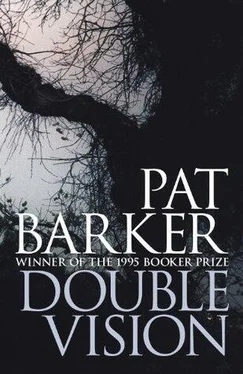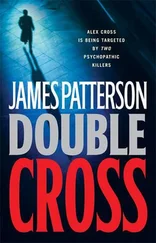The boat moved smoothly on between the cliffs until they came to a landing stage. The two sailors — both very young men, fresh-faced, freckled, blue-eyed, obviously brothers, descendants of the Vikings who’d plundered and pillaged and raped all along the coast, and not, emphatically not, of the monks who’d done none of these things — leapt on to the shore, tied up the boat to the staithes and handed the passengers out. An elderly man slipped on the green-slimed stones and would have fallen if it hadn’t been for the supporting hand. Gradually, in twos and threes, they streamed up the hill to the cluster of buildings at the top.
Stephen and Justine had waited for everybody else to get off, before jumping on to dry land. On either side of the path there were terns’ nests on the bare earth, some with chicks, speckled like the surrounding sand and shingle, huddled against the cold. Stephen bent down to look more closely, then straightened up. Immediately, they were above him, the adult terns, white wings angled back, beaks gaping red, claws outstretched as they swooped on to his head. Somehow he didn’t believe they would touch him. They’d just dive-bomb him and go past. But then he felt their claws and beaks jabbing his scalp. He put his hand up and brought his fingers away, smeared with blood. ‘Christ.’
Justine was laughing. ‘C’mon, let’s get away from the chicks.’
They marched at a brisk pace up the hill, Stephen flailing his arms around in a vain attempt to keep off the terns.
They followed the paths around the island. He was startled to see an eider duck sitting on her eggs immediately beside the path, and all the while the terns attacked, hovering inches above his head. A small child, screaming with fear, walked past with her father holding a folded newspaper over her head. ‘It’s not a good idea to bring small children,’ Justine said, which struck him as an understatement. And then they left the terns’ nests behind, and the screeches faded into silence, to be replaced by the squabbling of kittiwakes in their tenement slums.
Gradually the mist thinned and the sun shone more strongly, though their shadows were never more than smudges on the grass. They lay on the edge of a cliff, looking down on the grey and white backs of seagulls to where, far below — he daren’t think how far — the wrinkled sea fretted at the rocks. He was trying to recall a phrase from Ulysses , something about the snot-green, scrotum-tightening sea. Snot green, yes, but also blue, purple, grey, brackish brown, flecked here and there with white, the sleek dark heads of seals rising and falling with the waves. He rolled over and lay on his back, sucking a stem of grass. Justine was staring out to sea, not looking at him, not appearing to be aware that he existed even, and he wondered if she were back in the farmhouse, terrified and alone.
He reached out and touched her arm. She smiled, but went on looking out to sea.
She was thinking about Peter and the bloody roses. When finally she’d gone into the kitchen to look at them, she’d found half a dozen red, tightly furled blooms, each with a length of thin wire wound round the stem and through the bud itself, pinning the petals closed. No matter how much air, light, water, food you gave them, they would never open, but wither and die in the bud. She’d seen roses presented like this before, and had always disliked them, so it was irrational to associate them exclusively with Peter. But she did.
Peter’s ideal woman would be a doll, she thought, a puppet that would stay in any position you put it in, without life or volition of its own.
Completely the opposite of Stephen, who was so scrupulously careful not to constrain her in any way that he sometimes gave the impression of indifference. Go, he always seemed to be saying. Any time you like. Go.
Though he was looking anxious enough at the moment.
‘Come on,’ she said, getting him by the hand and pulling him to his feet. ‘Let’s go and see the puffins.’
Kate had worked till her neck ached from holding the same position too long, but when, finally, she stopped, the thought crossed her mind that she might have finished. You couldn’t always tell. There was a long period sometimes when you had to inch forward, knowing that one more unnecessary chip of the plaster could set you back three weeks.
Somehow or other she had to recover freshness of vision, to look at this as if she were seeing it for the first time. The secret was to put the critical intelligence to sleep, peel off the hard outer rind and work from the core. If she could have read a detective story, or played a game of chess, and carved simultaneously, that would have done the trick — anything to distract the top layer of the mind — but unfortunately she needed her hands.
She stepped back. It had looked like a fish at one point, on dry land, flapping, mouth open to gasp in the murderous air. Now it was more like a pupa starting to hatch, grave cloths peeling away to reveal new skin. What it didn’t look like, close to at any rate, was a man.
She climbed down from the scaffold, her thighs wobbly underneath her as she reached the floor, as if she’d been on a long voyage and hadn’t got her land legs back. Fearfully, she raised her head. Oh, God. Didn’t look human even from here. Strong, though. She felt its strength. Christ in a nightie it was not.
She went out of the studio, breathed deeply, suffered one of her infrequent cravings for a cigarette, and walked slowly down to the pond. Branches of willow shadowed the mist. A moorhen picked her way delicately through the tall thin reeds at the water’s edge and behind her three chicks, venturing out of the nest perhaps for the first time. Kate watched them, and thought of nothing, only the pleasure of seeing them.
When she turned round, Peter Wingrave was standing directly behind her. She hadn’t heard him arrive, and the shock made her jump.
‘I was just passing,’ he said. ‘I thought I’d look in and see how you were getting on.’
Time had weakened the resentment she’d felt at witnessing his parody, or whatever it was, of her working methods, his attempted invasion of her territory, and she found it perfectly possible to smile and say hello.
‘Come in,’ she said. ‘I was just having a break.’
He followed her into the kitchen and watched as she made coffee. Inside the house, with the door closed, she remembered the burglary, but she’d never been nervous with Peter, except for that one night. And anyway she didn’t for a moment suppose he was planning to bash her over the head and steal her credit cards. If he was dangerous, it was in more subtle ways than that.
‘Did you hear about Justine?’ he asked.
‘Yes. Beth told me.’
‘I went to see her last night.’
‘How was she?’
‘I don’t know. They’d given her a sedative, she was asleep.’ As he spoke, he clenched his knotted fingers, the knuckles pink, bunched together, like baby rats in a nest. ‘She walked in on them, apparently.’
‘Dangerous situation,’ Kate said, ‘cornering a burglar.’
‘Yes.’
‘I wonder if they’ll catch them?’
‘They might. Alec seemed to think so.’
There was no sound in the room except for the faint hum of the fridge. She had the feeling that whatever she wanted to know now he would tell her. Why he’d gone to prison — everything. So the only question was: did she want to know? No. She didn’t want the distraction from her work. And she felt too that any emotional involvement with Peter would simply give him scope for manipulation. She tapped the edge of her cup. ‘How’s the gardening?’
‘Busy. Always busy this time of year.’
She felt his disappointment. He’d been looking for another host.
Читать дальше












